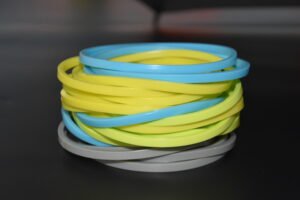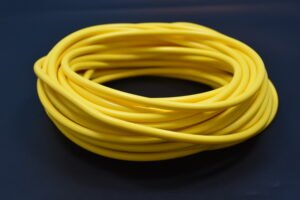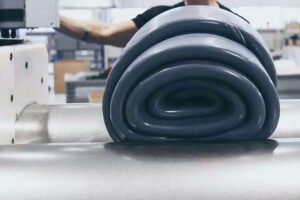Silicone, the revolutionary material that has taken the world by storm, is soaring in popularity and versatility. From kitchenware to healthcare, from electronics to personal care products, silicone has become an integral part of our everyday lives. Its remarkable properties make it a go-to choice for manufacturers and innovators across industries. With its heat resistance, flexibility, and excellent electrical insulation properties, silicone has revolutionized the way we cook, bake, and store food. It has replaced traditional materials like glass and metal, offering a safer and more convenient alternative. In the healthcare sector, silicone plays a crucial role in manufacturing medical devices and implants. Its biocompatibility, durability, and hypoallergenic properties make it ideal for a wide range of applications, ensuring patient safety and comfort. Silicone’s versatility extends beyond the kitchen and healthcare sectors. In electronics, it is used to protect delicate components from moisture, dust, and extreme temperatures. It is also a key ingredient in personal care products, providing a silky, non-greasy texture. As technology advances, so does the potential for silicone. With its countless benefits and adaptability, this remarkable material is here to stay, continuously pushing the boundaries of innovation.

History of Silicone
Silicone, a synthetic polymer, was first developed in the early 20th century. The initial discovery of silicones dates back to 1901 when English chemist Frederick Kipping began his pioneering research. However, it wasn’t until the 1940s that commercial production of silicone materials began. The advent of World War II accelerated the development and production of silicone due to its unique properties that were valuable for military applications. Post-war, the applications of silicone expanded rapidly into various industries.
Properties and Characteristics of Silicone
Silicone is known for its unique combination of properties that make it suitable for a wide range of applications. Key properties include:
- Heat Resistance: Silicone can withstand high temperatures without degrading, making it ideal for use in cooking and baking products.
- Flexibility and Elasticity: Silicone remains flexible and elastic across a wide temperature range.
- Chemical Stability: It is resistant to water, oxidation, and many chemicals, ensuring longevity and durability.
- Electrical Insulation: Silicone is an excellent electrical insulator, which is essential for electronic applications.
- Biocompatibility: Silicone is non-toxic and hypoallergenic, making it suitable for medical applications.
- Low Toxicity and Hypoallergenic Properties: This makes it safe for use in medical devices and implants.
Applications of Silicone in Various Industries
Silicone’s versatility has led to its adoption across numerous industries:
- Healthcare and Medical Devices: Silicone is used in catheters, implants, and prosthetics due to its biocompatibility and durability.
- Automotive Industry: Silicone is used in gaskets, seals, and hoses for its heat resistance and flexibility.
- Electronics: Silicone is essential for protecting components from moisture and heat, used in cables, keypads, and insulation materials.
- Construction: Silicone sealants are widely used for their durability and weather resistance.
- Personal Care Products: Silicone is a key ingredient in cosmetics and skincare products, providing a smooth, non-greasy feel.

Silicone Tubing
Silicone tubing is an essential component in many industries due to its exceptional properties:
- Medical Use: In the healthcare sector, silicone tubing is utilized in various devices such as catheters and IV sets. Its biocompatibility ensures patient safety, while its flexibility and durability make it reliable for continuous use.
- Food and Beverage: Silicone tubing is widely used for transferring liquids in the food and beverage industry. It is non-toxic, heat resistant, and can handle a wide range of temperatures, ensuring safe and efficient processing.
- Industrial Applications: In industrial settings, silicone tubing is used for transferring chemicals and other fluids. Its chemical resistance and stability under extreme conditions make it ideal for these applications.
Silicone Seals and Gaskets
Silicone seals and gaskets are crucial for ensuring the integrity and performance of various systems:
- Automotive: In the automotive industry, silicone gaskets and seals are used to prevent leaks and withstand high temperatures in engines and transmissions.
- Electronics: Silicone seals protect sensitive electronic components from moisture, dust, and other contaminants, ensuring the longevity and reliability of devices.
- Construction: Silicone sealants are employed in construction for their durability and flexibility, providing long-lasting seals for windows, doors, and other structures.
Advantages of Using Silicone
The use of silicone offers numerous benefits:
- Durability: Silicone products are long-lasting and resistant to wear and tear.
- Safety: Non-toxic and hypoallergenic, silicone is safe for use in medical and food-related applications.
- Versatility: Silicone can be molded into various shapes and forms, making it suitable for diverse applications.
- Environmental Resistance: Silicone withstands extreme temperatures, UV light, and harsh environmental conditions.
Innovations and Advancements in Silicone Technology
Advancements in silicone technology continue to drive innovation:
- High-Performance Silicone: New formulations enhance heat resistance and durability.
- Eco-Friendly Silicones: Development of silicones with reduced environmental impact.
- Medical Grade Silicone: Innovations in biocompatibility and performance for medical devices.

Silicone in Healthcare and Medical Applications
In healthcare, silicone’s unique properties make it indispensable:
- Medical Implants: Silicone is used for its biocompatibility and durability.
- Prosthetics: Flexible and comfortable, silicone prosthetics improve quality of life for amputees.
- Medical Tubing and Seals: Used in various medical devices for its flexibility and resistance to sterilization processes.
Silicone in Consumer Products
Silicone has transformed consumer products:
- Kitchenware: Silicone baking mats, molds, and utensils are heat resistant and non-stick.
- Personal Care: Found in shampoos, conditioners, and skincare products for its smooth texture and moisture resistance.
- Household Items: Silicone seals, gaskets, and adhesives are used for their durability and flexibility.
Environmental Impact and Sustainability of Silicone
Silicone is considered more environmentally friendly compared to many alternatives:
- Longevity: Silicone products have a long life span, reducing waste.
- Recyclability: While not universally recyclable, silicone can be downcycled into industrial products.
- Non-Toxic: Silicone does not leach harmful chemicals, making it safer for the environment.

Conclusion
Silicone has emerged as a versatile and revolutionary material, transforming industries with its unique properties and adaptability. From medical devices to kitchenware, its impact is vast and growing. As advancements in silicone technology continue, its applications will expand further, solidifying its place as an indispensable material in modern life. The rise of silicone is a testament to human innovation and the relentless pursuit of materials that improve safety, efficiency, and sustainability across various sectors.


